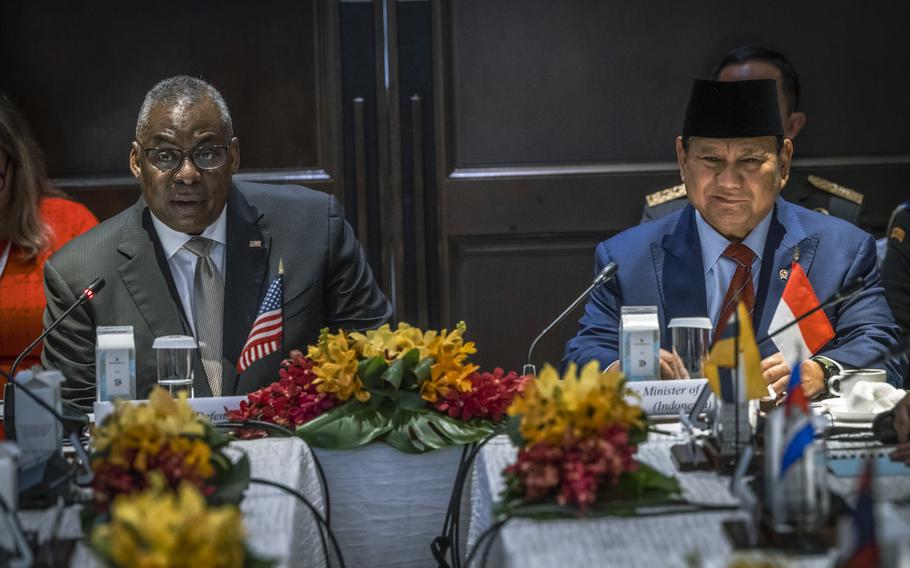
Secretary of Defense Lloyd J. Austin III and Indonesian Minister of Defense Prabowo Subianto adjourn a meeting of the Association of Southeast Asian Nations (ASEAN) at the International Institute for Strategic Studies (IISS) 20th Shangri-La Dialogue in Singapore, June 2, 2023. (Chad J. McNeeley/Defense Department)
The Indonesian government is preparing for the 2024 elections and the transfer of power from President Joko Widodo (Jogowi) to a worthy successor. Leading a quarter of a billion people, in a nation of 17,000 islands spread over a region larger than the United States, is no easy task. Jogowi has done this well. Being dedicated to democracy in Indonesia, the popular leader has made clear his opposition to a constitutional change that would allow him to serve beyond the existing two-term limit.
The key to future progress requires continuity of the Jogowi administration’s policies and initiatives. One very viable successor is part of the current government: former general and current Defense Minister Prabowo Subianto, who has run for the office of president twice before.
Prabowo has proven himself to be a unifier both within Indonesia and in the international community. Considering Indonesia’s diverse population, this is critical within the country. With a record to back his words, Prabowo has pledged that no one will be left behind.
As defense minister, Prabowo continues to build Indonesia’s defense capabilities. He recognizes that his country is in a region of historical tension that could repeat itself if the nation is not ready to repel threats. He also recognizes the need to allow diplomacy to work.
Moving onto the international stage, the importance of Indonesia is evidenced in geography and history. From the west to the southeast of the Philippines, the Indonesian archipelago stretches from mainland Asia to Australia. The spread of these islands has encouraged rather than deterred foreign invasions and encroachment. A millennium ago, it became the easternmost expansion of Islam. Today, over 87% of Indonesians are Muslim.
For its natural resources and geographical importance, the Dutch seized Indonesia during the age of European colonization. Japan occupied and used the entire region to threaten Australia and inhibit sea travel during World War II. Indonesia separates the Pacific and Indian oceans.
After Japan’s defeat, Indonesia achieved independence despite Dutch ambitions to regain control of the archipelago. Indonesia’s nation-state status has not stopped foreign powers from attempting regional influence to this day.
Working on a three-prong approach of sea power, artificial islands and economic influence, China is determined to become the dominant regional power. Its Belt and Road Initiative would be greatly enhanced if it controlled the water routes between the Indonesian islands. Favoring either the West or China over the other could escalate hostilities. Prabowo makes it clear he sees his role as impartial moderator and will work with both sides evenly, which also benefits the development of his country.
Indonesia also has a critical role in preventing the spread of Islamic terrorism further into the Pacific region. One of al-Qaida’s principal objectives is to gain control of all nations once under the control of Muslim powers. That includes all the way from Spain, to Indonesia, and deep into Africa. As both army general and defense minister, Prabowo has made sure his country is not going to be infiltrated like neighboring Malaysia.
Indonesia desires a seat on the United Nations Security Council and to serve as the global south representative. To become a permanent member of the council would require a change to the five-member limitation set by the 1945 U.N. Charter. General Assembly selection for Indonesia to serve as one of the 10 non-permanent members would be in the best interest for global security.
Should this happen, the two-year term on the Security Council would be concurrent with Indonesia’s election cycle. As the most well-known candidate for president, Prabowo’s positions on his country, the region and the world need to be understood. Two of the most telling revelations are found in his 2021 article published in The Diplomat and a 2022 interview published in Al Jazeera.
As an Army officer, Prabowo has experienced the horrors of war and knows that the ones who suffer the most are the non-combatants whose families, homes, communities and even countries are destroyed. His position against military aggression has placed him at odds with the Kremlin. Prabowo has called for the recognition of Ukraine’s territorial integrity and an end of hostilities.
At present Prabowo has positioned himself well both as the leading candidate and in his ability to work with Indonesia’s elected legislature. He has taken a progressive role in achieving peace on the world stage. Over the next several years, challenges to global security and peace are going to intensify. Strong and decisive leaders are going to be needed to navigate their nations and the international community through difficult times. Prabowo has proven himself ready to accept these challenges.
Wes Martin is a retired U.S. Army colonel who has served in law enforcement positions around the world.